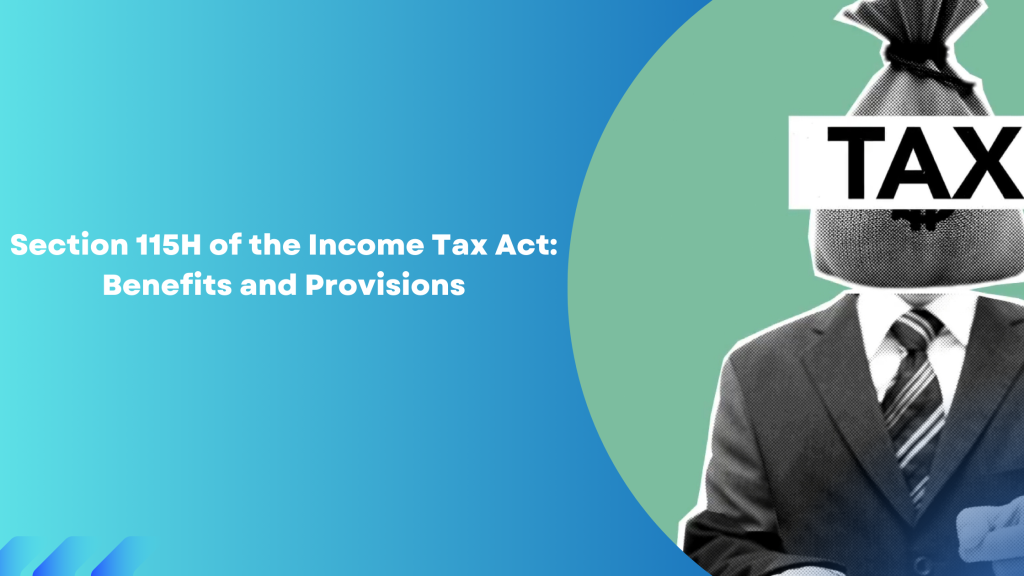Under the Income Tax Act, 1961, individuals can be classified into one of three residential statuses: resident, non-resident Indian (NRI), or resident but not ordinarily resident (RNOR).
The classification depends on the number of days an individual spends in India, but this status is not fixed and can vary based on the purpose and duration of stay.
Section 115H pertains to those who were NRIs in the previous year but have become residents in the current financial year. Let’s explore the details of this section.
Section 115H of the Income Tax Act Explained
Chapter XII-A of the Income Tax Act offers non-residents a special tax concession of 20% on income from foreign exchange asset investments. This benefit is not extended to resident Indians.
Should an NRI become a resident Indian in any year, they have the option to continue enjoying the benefits of Chapter XII-A. They need to submit a written declaration to the assessing officer, expressing their wish to have the provisions of Chapter XII-A apply to their investment income derived from foreign exchange assets.
Advantages Under Section 115H of the Income Tax Act
By submitting a written statement to the assessing officer along with their income tax return for the year they are considered a resident, a non-resident can continue to receive the following benefits:
- 20% Tax Reduction on Investment Income: They will continue to benefit from a 20% tax reduction on investment income from foreign exchange assets.
- 10% Tax Break on Long-Term Capital Gains: They can still avail a 10% tax break on long-term capital gains for specified assets and dividend income.
- Concessional Levy on Foreign Exchange Assets: They can enjoy a concessional levy until the foreign exchange asset is converted into money.
- Tax Concession on Convertible Foreign Exchange Transfers: They can retain concessional tax rates for specified assets, even when transferring convertible foreign exchange between banks.
Key Provisions of Section 115H of the Income Tax Act
The following points detail the provisions of Section 115H:
- Eligibility:
- Individuals of Indian origin (with parents or grandparents who were Indian) can avail of Section 115H benefits. If they lack resident status, they are deemed non-residents under the act.
- Foreign Exchange Assets:
- Defined as assets acquired in convertible foreign exchange.
- Specified Assets:
- Includes the following assets. Once an NRI becomes a resident Indian, they lose privileges on income from Indian company shareholdings. Specified assets, per Section 115C, are:
- Central Government securities as defined by the Public Debt Act, 1944.
- Shares in Indian companies.
- Debentures issued by public Indian companies.
- Deposits with public Indian companies.
- Other assets specified by the Central Government.
- Includes the following assets. Once an NRI becomes a resident Indian, they lose privileges on income from Indian company shareholdings. Specified assets, per Section 115C, are:
- Concessional Rates:
- Non-residents can retain concessional rates on specified assets (excluding Indian company shares) by filing a return under Section 139 and expressing their choice in writing.
- Dividend income is included since 01.04.2021.
- Residential Status:
- A person qualifies as a resident if:
- They stayed in India for 182+ days in the relevant previous year.
- They stayed in India for 365+ days in the last four years, including at least 60 days in the relevant year.
- An individual qualifies as RNOR if:
- They were residents for 2+ out of the last 10 years.
- They stayed in India for 730+ days in the last seven years.
- Those not meeting these criteria are non-residents for tax purposes.
- A person qualifies as a resident if:
- Changing Residential Status:
- Residential status may change yearly based on previous stays. For example, a resident in 2022-2023 could become a non-resident in 2023-2024, and vice versa.
- Section 115H Benefits:
- Non-residents can continue enjoying concessional tax benefits after becoming resident Indians if they timely file their returns, maintaining benefits as non-residents.
Frequently Asked Questions
What are the tax benefits under Section 115H?
Under Section 115H of the Income Tax Act, non-resident Indians (NRIs) can enjoy special tax privileges for foreign exchange asset investments. These benefits include:
- A 20% tax concession on investment income from foreign exchange assets.
- A 10% tax concession on long-term capital gains from specified assets and dividend income.
- Concessional tax rates until converting foreign exchange assets into money.
What is the tax rate applicable to dividend income earned by NRIs under Section 115H?
Dividend income earned by NRIs from Indian companies is taxed at a flat rate of 20%, compared to the normal tax rate of 30%.


